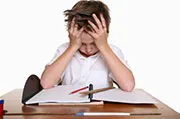Study found they were more likely to be diagnosed with mood disorder, but reason for link is unclear
WebMD News from HealthDay

By Amy Norton
HealthDay Reporter
FRIDAY, Oct. 25 (HealthDay News) -- Children who've suffered a concussion or other head injury seem to have a much higher-than-average rate of depression, a new study finds.
Using data from a U.S. health survey, researchers found that children and teenagers who'd ever sustained a brain injury were much more likely to have ever been diagnosed with depression.
Overall, 15 percent had received that diagnosis, while the national prevalence was less than 4 percent, the investigators noted.
The finding does not prove that kids' head injuries caused the depression, said Keith Yeates, a pediatric neuropsychologist who was not involved in the study.
But there is a "well-documented" connection between brain injury, particularly more severe ones, and depression in adults, said Yeates, who heads pediatric psychology and neuropsychology at Nationwide Children's Hospital in Columbus, Ohio.
There have been some small studies of children, but the findings have been more mixed, according to Yeates. While this latest study doesn't prove cause-and-effect, it does support an association between brain injury and depression in kids, he said.
It's not clear why the link exists, Yeates noted. Even so, he said doctors should assess children for behavioral problems and mood symptoms, including depression and anxiety, as part of their follow-up after a head injury.
Dr. Matthew Wylie, a pediatric emergency specialist who led the study, agreed. "It's helpful for pediatricians to recognize that there is this potential for depression, and to be attuned to it."
Wylie presented the findings Friday at the American Academy of Pediatrics national conference in Orlando, Fla.
The results are based on a 2007 nationally representative study covering nearly 82,000 children and teens younger than 18. Just over 2,000 parents said their child had ever been diagnosed with a "brain injury or concussion," and just over 3,100 said their child had ever been diagnosed with depression -- for a national rate of 3.7 percent.
Among kids with a past head injury, however, the rate of depression was about four times higher, at 15 percent, the investigators found.
The researchers then weighed other factors in children's depression risk, such as family income and mothers' mental health. In the end, kids with a history of head injury still had double the risk of depression as other kids.
The study had a number of limitations, both Wylie and Yeates pointed out.
One is that "brain injury" and "concussion" were lumped together into one question, Yeates noted. So it's not possible to tell whether kids who suffered mild concussions had the same depression risk as those with more serious brain injuries.
It's likely that more severe injuries would carry a greater risk, Wylie said. But that's a question for future studies, he added.
source : Children With Head Injuries May Be Prone to Depression








